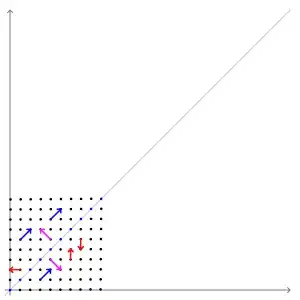For a $n\times n$ matrix $A$, viewed as a linear transformation on a vector space of dimension $n$ , an eigenvector of $A$ is just a nonzero vector $v$ on which $A$ acts by scaling. Ie, $Av = \lambda v$ for some scalar $\lambda$. This scalar $\lambda$ is the eigenvalue associated to the eigenvector $v$.
Some matrices have lots of eigenvectors. For example, the $n\times n$ identity matrix has every nonzero vector as an eigenvector, all of them with eigenvalue 1. A diagonal matrix has every basis vector as an eigenvector (ie, if $A$ is diagonal w.r.t. a basis $\{v_1,\ldots,v_n\}$, then each $v_i$ is an eigenvector for $A$, and its eigenvalue is just $A_{i,i}$).
Some matrices have no eigenvectors. For example, any rotation matrix does not have an eigenvector, since it acts on every nonzero vector by rotation around the origin, so no vectors are scaled.
If you have some specific questions I could try to answer those.
